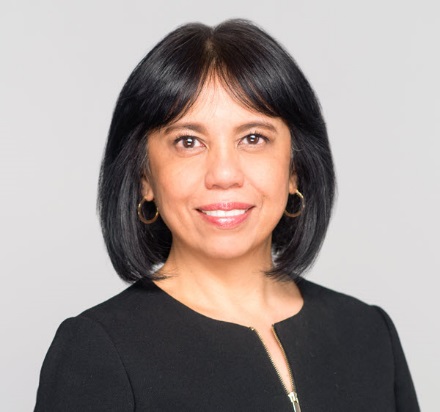By Nina Huang
NORTHWEST ASIAN WEEKLY

Vivian Young, Global Head of Asian & Pacific Islander Affairs, JPMorgan Chase
When Vivian Young looks back on her family’s journey from the Philippines to New York, one image stands out: a photograph of her and her mother boarding a plane, holding their medical X-rays required for U.S. entry—proof that they didn’t have tuberculosis. She was just 3 years old.
Her father was an accountant, her mother an administrative assistant, and they settled on Long Island.
From a young age, Young was introduced to the value of financial discipline. She remembers depositing her first paycheck at a local bank and watching her savings grow.
“What do all of these things mean?” she thought to herself. That curiosity became a driving force, eventually leading her to a career in finance.
Today, Young serves as Global Head of Asian & Pacific Islander Affairs at JPMorgan Chase. In this role, she leads initiatives that connect the financial institution to the Asian American and Pacific Islander (AAPI) community, focusing on a deeply personal mission: helping families understand and build generational wealth—the financial resources and knowledge passed down to give future generations a stronger foundation.
“My mom was in her 20s, leaving everything she knew for an unknown country, with a toddler in tow,” Young recalled. “I carry that sacrifice with me every day. It drives me to make sure I don’t waste an opportunity—and to help others build a more secure future.”
A curiosity sparked early
Growing up, Young observed her family’s approach to money.
“One thing I noticed as I got older was that we were great savers, but not-so-great investors,” she said. Her curiosity about how money works, and how it could grow and sustain a family, pushed her toward finance—a path she initially never envisioned for herself.
Starting as an assistant at a municipal bond firm, Young was studious in learning about clients and financial markets. She pursued financial planning certification and built a career spanning financial planning, product development, and wealth management before moving into leadership at JPMorgan Chase.
“I never dreamed of being in finance,” she admits. “But I always wanted to understand how it worked—and how to help others navigate it.”
Culture and money
Young has witnessed how culture shapes financial habits.
“Seventy percent of Asian Americans are foreign-born, and we carry our cultural practices with us,” she said.
For some families, wealth is stored in gold or large amounts of cash kept at home, reflecting both tradition and a mistrust of institutions. Many children of immigrants juggle not only their own financial planning but also helping parents understand retirement accounts, taxes, and estate planning.
“It’s a lot of responsibility,” Young said. “We’re caring for our kids, saving for our retirement, and also our parents’ retirement plans.”
But cultural habits can sometimes create risks. Properties held solely in parents’ names may leave younger generations unprotected, and small businesses may close without proper succession planning.
“The irony is that Asian culture prioritizes keeping family intact. But without planning, the outcome can be the opposite,” she said.
Beyond the averages
A recent Pew Institute study shows that Asian Americans appear to fare well economically, with a 2019 median income of $85,800, compared with $61,800 for all U.S. households. Yet the group also has the highest income inequality of any racial group, with nearly an 11% gap between the lowest and highest earners.
Young explained that these numbers can be misleading.
“Community is not monolithic,” she said. “The assumption is based on aggregation that everyone is doing well, but not a lot of people in the community are challenging this data, because this isn’t really true. Folks aren’t getting enough financial education resources.”
For many AAPI communities, support comes from social networks such as churches or local community centers. JPMorgan Chase employs community managers nationwide to help these communities address challenges and make informed financial decisions.
On paper, Asian Americans seem to thrive. In 2022, the median net worth of Asian households was more than $535,000—double that of white households and eight times that of Black or Hispanic households. But Young said that averages don’t tell the full story.
“Asian Americans have the biggest income gap of any racial group in the U.S. Families who arrive with work visas have stability, while refugees may arrive with nothing. Some are thriving, but many are struggling in silence,” she said.
This “model minority” perception can prevent struggling families from accessing help.
“Because people assume Asian Americans are doing fine, the communities most in need often get overlooked,” she added.
Teaching the next generation
For Young, generational wealth is not just about money—it’s about knowledge.
“Too many families lose homes or businesses because there wasn’t a plan, and that’s preventable,” she said.
She advocates for starting financial education early. Only 27 states require personal finance classes for high school graduation, and Washington is not one of them.
“We need to teach kids how to budget, save, and plan. That benefits everyone, not just our community,” she said.
A mission rooted in sacrifice
Young’s drive is grounded in her family’s immigrant story and the hardships she witnessed growing up. She recalled watching her parents endure discrimination and yet remain resilient.
“We were just surviving back then,” she said.
“Now, I want to make sure others don’t just survive, but thrive. I want our community to have the information and resources to make better financial decisions—for themselves and for future generations.”
For Young, building generational wealth is about more than financial security. It’s about honoring her mother’s courage, lifting up her community, and ensuring that no sacrifice is wasted.
Nina can be reached at newstips@nwasianweekly.com.
